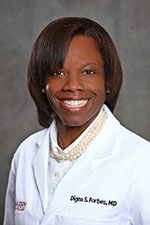Something kept confounding Richard Rapoza and his team of clinical affairs experts. Regardless of how his team tried to vary approaches to reach a more diverse set of trial participants, who could potentially benefit from those trials, the data showed that the majority of patients enrolled in many of the clinical trials were white male patients—to the tune of 70%.
For Rapoza, divisional vice president of global product development within our Vascular division, conversations with colleagues across Abbott and with outside experts often reached similar conclusions:
Yes, the problem was common.
No, there wasn't any one simple solution.
Improving diversity within clinical trials is critical to begin closing gaps in health equity and to better understand the potential benefits of new therapies on a broader range of patients.
"When considering the care pathway for patients from racially and ethnically diverse backgrounds, very real barriers exist to helping these patients access and participate in the trials process," said Rapoza. "Each barrier requires a thoughtful approach to developing impactful solutions, but one barrier we have to start focusing on now is producing more diverse clinical researchers that will lead and participate in these clinical trials in the future."
As we explored ways to improve diversity within trials, one immediate need came clearly into focus: increasing the number of physicians, nurses and research coordinators from diverse backgrounds who can lead future clinical trials.
Past research has shown that patients prefer doctors that share their race or ethnicity and that people often face challenges finding clinicians who share or understand their culture. These challenges can amplify existing trust issues present within many racial or ethnic communities. They can also add to therapy and treatment barriers often seen through the trial process.
"The front lines of the whole research process are the doctors serving as clinical investigators, along with the nurses and the research coordinators who help with the flow of patients into clinical trials," said Rapoza. "But without increasing the number of these clinicians and expanding our ability to bring on new trial sites in areas that will open access to a more diverse patient population, we won’t truly solve the problem."
Support for Diverse Trialists of the Future
We have launched the Abbott Scholars scholarship program for students of color who are studying to become nurses and doctors—the very people who will lead future clinical trials. This is just one part of a broader initiative to improve diversity in clinical trials. Over the next five years, we will commit $5 million to fund nearly 300 scholarships through new partnerships with medical schools at these historically black colleges and universities (HBCUs) and nursing associations:
We want to support more students with an interest in clinical research, with the clear goal of producing more racially and ethnically diverse nurses and trialists who, if given the opportunity, will dramatically impact trials in the future.
Dr. Daphne Calmes, Associate Dean of Student Affairs, College of Medicine, Charles R. Drew University of Medicine and Science (CDU), believes the scholarships will go a long way toward making it affordable for graduates to practice at these centers. "The average medical graduate owes $241,600 in total student loan debt," Calmes said. "CDU has been particularly successful in training health professional students that ultimately work in predominantly underserved areas, but it is imperative to assist them in reducing the level of indebtedness at graduation. Without the worry of repaying student debt, these students will be able to concentrate on disciplines like clinical research that ultimately give back to their communities."
 Digna Forbes, M.D., interim dean, School of Medicine, Meharry Medical College, agreed. "The majority of our students come from underrepresented communities," she said. "These scholarships will allow them to not only follow their heart and practice in a primary care career of their choice, but also pursue their research interest, while helping Meharry retain the best candidates."
Digna Forbes, M.D., interim dean, School of Medicine, Meharry Medical College, agreed. "The majority of our students come from underrepresented communities," she said. "These scholarships will allow them to not only follow their heart and practice in a primary care career of their choice, but also pursue their research interest, while helping Meharry retain the best candidates."
In addition to tuition assistance, the funds will help provide future nurses and physicians with additional skills and support, including opportunities to learn about clinical research. "We will develop enhanced training around health disparities and social determinants of health to prepare them to provide care for a diverse population," said Angela Minniefield, Senior Vice President, Operations and Advancement, CDU. "Students will also have increased access to course materials, clinical supplies, and reliable transportation to clinical sites."
In addition to scholarships, we are focusing on three other areas as part of our broader call to action for diversity:
Ultimately, concentrating our efforts to assist medical students at HBCUs makes sense in the effort to diversify clinical trials.
 "Compelling research shows that patients seek physicians of the same race," said Jamaine S. Davis, Ph.D., course director, Medical Student Research Experience, Meharry Medical College. "By increasing the number of diverse clinical researchers who are developing and administering the trials, we can create a more diverse patient pool and research workforce."
"Compelling research shows that patients seek physicians of the same race," said Jamaine S. Davis, Ph.D., course director, Medical Student Research Experience, Meharry Medical College. "By increasing the number of diverse clinical researchers who are developing and administering the trials, we can create a more diverse patient pool and research workforce."
Please be aware that the website you have requested is intended for the residents of a particular country or region, as noted on that site. As a result, the site may contain information on pharmaceuticals, medical devices and other products or uses of those products that are not approved in other countries or regions.
The website you have requested also may not be optimized for your specific screen size.
Share